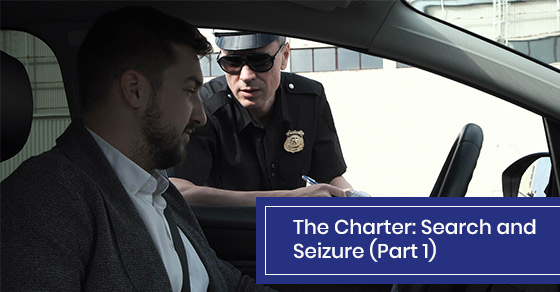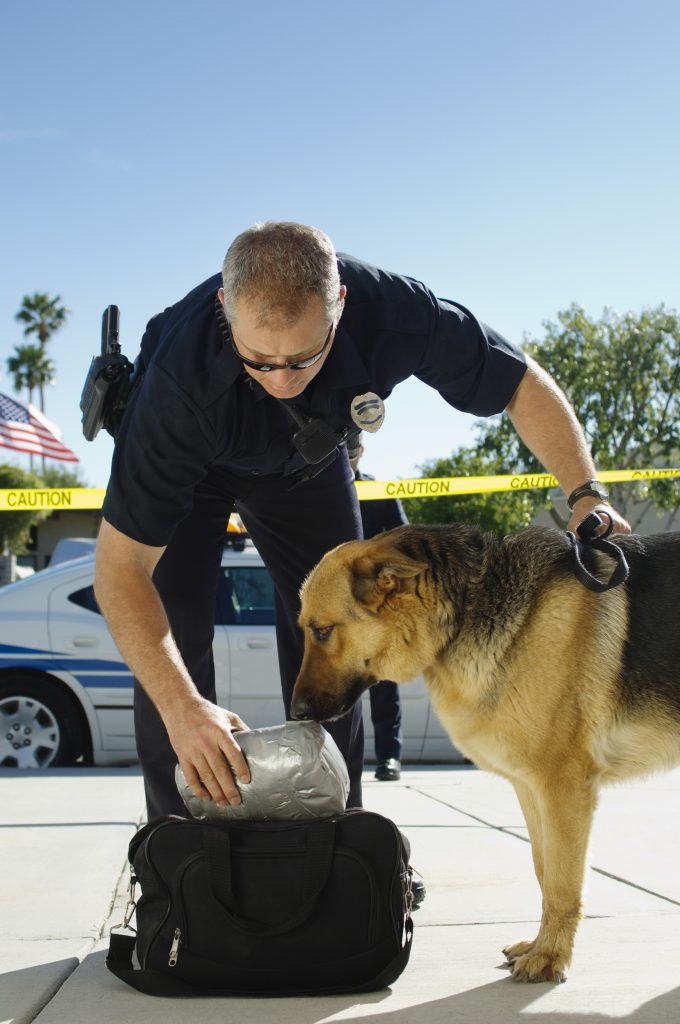The Charter: Search and Seizure (Part 1)

Blog by Rudrakshi Chakrabarti and Arun S. Maini
The Charter of Rights guarantees that “Everyone has the right to be secure against unreasonable search or seizure”.
What does this mean?
What is a search? A seizure? Do the police always need a warrant, or can they search without one? What is a reasonable expectation of privacy? At what point does a search or a seizure by police become unreasonable?
At its core, the law of search and seizure is concerned with the concept of a “reasonable expectation of privacy”. If you do not have a reasonable expectation in the place or thing being searched, your rights under the Charter will not be violated by its search or seizure by police.
What is a search?
A search is the inspection of an object, a person or a location by police with a view to detecting or investigating criminal activity.
The question that engages your rights is whether the search was legal. This requires an examination of the following questions:
- What is being searched?
- Why is it being searched?
- Do you have a reasonable expectation of privacy in the thing or place being searched?
- What information do the police have at the time of the search?
- Is the search authorized by a warrant?
- What techniques did the police use?
What is a seizure?
A seizure is the taking of an object from you by police without your consent. It often occurs after a search, during a police investigation.
As with a search, the question that engages your rights is whether the seizure was legal. This requires an examination of the same questions:
- What is being seized?
- Why is it being seized?
- Do you have a reasonable expectation of privacy in the thing being seized?
- What information do the police have at the time of the seizure?
- Is the seizure authorized by a warrant?
- What techniques did the police use?
What is a “reasonable expectation of privacy”?
In the context of a search or seizure by police, what does it mean to have a “reasonable expectation of privacy” in the person, place or thing being searched or seized?
A reasonable expectation of privacy has certain key components:
- The item or place can reveal personal information about your identity, your values or your choices;
- You might wish to keep that information private, or at least away from the police;
- You do not want the police to be able to examine the item or place that they want to search;
- You do not want the police to seize the item and take it away;
- Society believes that you should be entitled to keep that information hidden from police.
Obviously, what should be protected from the prying eyes or hands of the police depends on many factors. Some items or places are more easily seen as being private. For example, your bedroom is a place that you should be able to keep away from a police search. So should your bodily cavities or bodily fluids like blood or saliva. So is your cellphone’s internet search history.
But what about a tissue that you blew your nose with, and threw into a municipal garbage can? The mucus contains your DNA, which has highly private and intimate information that you might not wish police to seize and analyze. But if you threw the tissue away, do you still have a reasonable expectation of privacy?
Can the police walk up your driveway and knock on your door without your permission? Yes they can. But can they look over your shoulder and scan the hallway for a suspect they are looking for when you open the door? Can they sniff for the smell of an illegal drug? Can they peer over your fence into your backyard, or through a window into your garage? Can they flash a light into the back seat of a parked car? Does it make a difference if the car is in your driveway rather than a public parking lot?
The police can ask to see a driver’s licence. But can they ask the passenger to identify herself?
If you are arrested for a curfew violation, can the police search your car? Can they seize your cellphone and search through it?
You might expect that a text message that you received should remain private. But do you have a reasonable expectation of privacy in a text, if the police search the phone of a person you sent the text to?
How to know if you have a reasonable expectation of privacy?
This issue is usually decided after a search or seizure has taken place and the matter is in court. The lawyers or the judge have to look back to the circumstances that existed at the time of the search and/or seizure to decide if you had a reasonable expectation of privacy at the time.
In some cases, the location can be a key factor: a bedroom or safety deposit box, for example.
Sometimes it involves the subject-matter: the alcohol content in your blood; a thumb drive; your phone records or your diary.
Sometimes it can be the relationship that cloaks the information with a reasonable expectation of privacy: what you told a post office clerk on the phone, compared to what you discussed with your therapist, for example.
Sometimes it can be the purpose for which the police want the information. For example, checking to see that one’s driver’s licence is valid might not permit that information to be used to look up your criminal record. A pat-down for officer safety might be ok; the seizure of a car key in your pocket to open the trunk might not.
There is no hard and fast rule for when a reasonable expectation of privacy will exist. All of the facts and circumstances that can impact whether you can, should, or did have a reasonable expectation of privacy at the time that the police were involved, must be considered. Because facts and circumstances can differ widely, they have to be examined on a case-by-case basis. Some situations are most obvious than others.
The issue of whether you had a reasonable expectation of privacy has both a “subjective” and an “objective” component. In other words, did you personally believe that you had a right to keep that information away from police? (the subjective element) And whether you did or not, does society believe that you did? (the objective element).
You can see from these questions that this issue is one that is infused with choices about which values are most important in our society. That is what the Charter of Rights is all about: what values does Canadian society guarantee and protect against government intrusion?
In our next blogs, we will examine these and other issues related to search in seizure, such as:
- What is a search warrant, and when do police need one?
- What are “reasonable and probable grounds?”
- What happens if the search or seizure was illegal?
You can read Part 2 of our series on Search & Seizure here, and you can read Part 3 of our series on Search and Seizure here.
If you or a loved one are facing criminal charges and need the advice of an experienced and skilled lawyer to help you through the legal process, call The Defence Group for a free consultation at 877-295-2830.
Rudrakshi Chakrabarti is a student at Windsor Law School
Arun S. Maini is a criminal lawyer and former prosecutor with 25 years of experience


